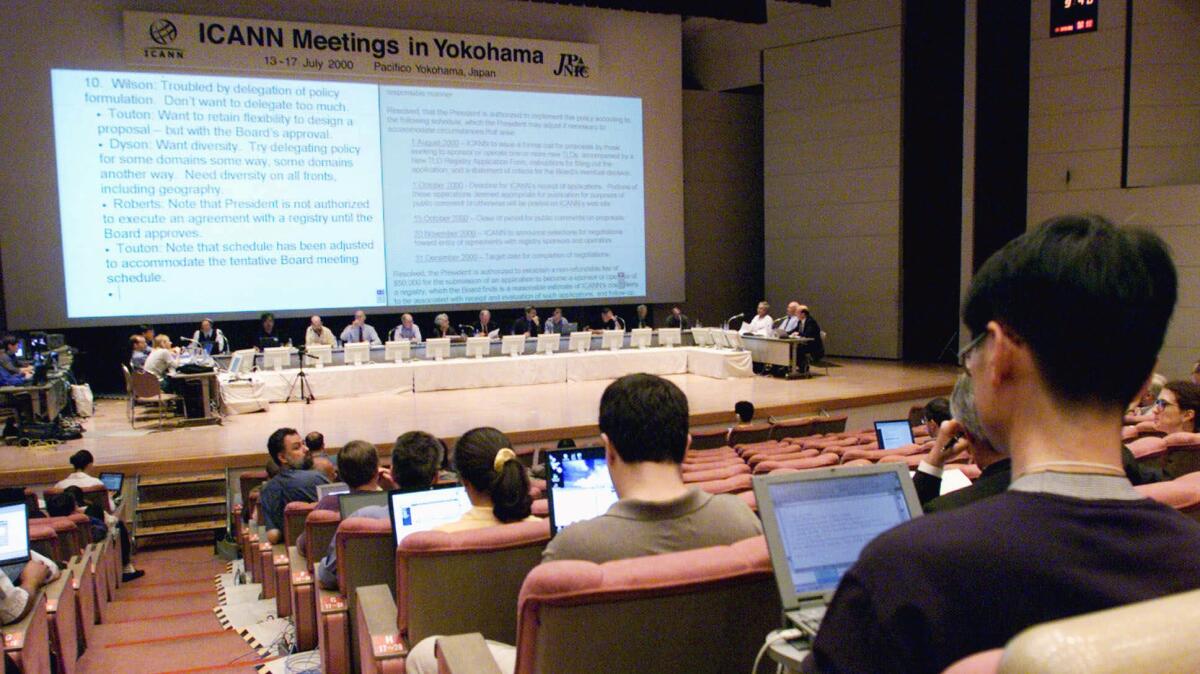Opinion: The free and open Internet dodges a bullet in the Senate

- Share via
Running backs love an open field, cab drivers a well-timed series of green lights.
Demagogues love straw men. Like, say, the Obama administration’s diabolical plan to hand control of the Internet to Vladimir Putin.
For the record:
1:42 a.m. June 8, 2025An earlier version of this blog post incorrectly identified the entity in charge of the master list of major Internet domains as the Internet Assigned Names Authority. It is the Internet Assigned Numbers Authority.
There is no such plan — and neither the United States nor any other country controls the Internet, at least not outside their borders. Yet you wouldn’t know that if you listened to Sen. Ted Cruz (R-Texas) talk about the administration’s move to transfer the Internet Assigned Names Authority, which manages the master list of major Internet domains (.com, .net, .edu and the like), to a California nonprofit, the Internet Corp. for Assigned Names and Numbers, on Oct. 1.
This issue is far, far down in the weeds of technology policy, and yet it became such a flashpoint on Capitol Hill that it almost made its way into the short-term funding bill needed to keep the government open past Sept. 30. Cruz appears to have been stymied, however; Senate Majority Leader Mitch McConnell (R-Ky.) has instead offered a “clean” spending bill with no room for such disputed policy riders.
It would be nice to say that clear heads and rational thought prevailed, or that Republicans started to doubt Cruz’s position as soon as Donald Trump threw his weight behind it. Trump’s national policy director, Stephen Miller, echoed Cruz’s arguments in a statement Wednesday saying, “The U.S. should not turn control of the Internet over to the United Nations and the international community. President Obama intends to do so on his own authority — just 10 days from now, on October 1st, unless Congress acts quickly to stop him.”
Instead, it appears that Cruz was undone by the clock. With senators on both sides of the aisle seeking to add riders to the bill, several of which were contentious, the measure was headed for a drawn-out fight. And with vulnerable incumbents eager to get back to the campaign trail, McConnell decided that a clean bill — which Democrats had demanded — represented the path of less resistance.
That’s a good thing, because the Internet Assigned Names Authority (IANA) transition issue is hard to explain, which plays right into the hands of the Internet-giveaway fabulists. There’s a grain of truth to Cruz’s story: The U.S. National Telecommunications and Information Administration, an agency within the Department of Commerce, controls IANA. And the things IANA oversees, including the master list of domains and some key data-transmission protocols, help assure that the Internet functions as a seamless global network of networks, not disparate regional islands of data.
But the federal government hasn’t run IANA for years. Instead, it hired the Internet Corp. for Assigned Names and Numbers (ICANN) to do that, with a minimum of supervision. ICANN was formed to make sure the entities with the largest stakes in the Internet — telecommunications companies, online service providers, researchers, equipment makers and, yes, governments — would jointly have a say in the creation and management of domains.
Retaining control over IANA would admittedly keep a bit of leverage the federal government can use to bend ICANN to its will. And ICANN does have its faults. But U.S. leverage of the Internet is the problem, not the solution. Repressive regimes have been trying to persuade the United Nations and other international groups to assert authority over the Internet’s standards and protocols, in part because they argue that the U.S. government shouldn’t have a unique relationship with a global communications network. Putting the Internet under the U.N., not transferring IANA to ICANN, would truly open the door to Russia and China censoring the Internet outside their borders by giving them and their allies more power to manipulate Internet standards.
This country’s representatives have held those efforts at bay, mainly by arguing that the current “multistakeholder” approach to Internet governance is more fair and true to the Internet’s spirit than a government-led alternative. Canceling the plan to turn IANA over to ICANN would signal that the United States doesn’t really believe in multistakeholder governance, so why should anyone else?
That’s a far more complex and nuanced picture than the one Cruz has drawn. But for now, at least, it appears that the Senate won’t be blocking the IANA transfer because of a straw man.
Twitter: @jcahealey
More to Read
A cure for the common opinion
Get thought-provoking perspectives with our weekly newsletter.
You may occasionally receive promotional content from the Los Angeles Times.










